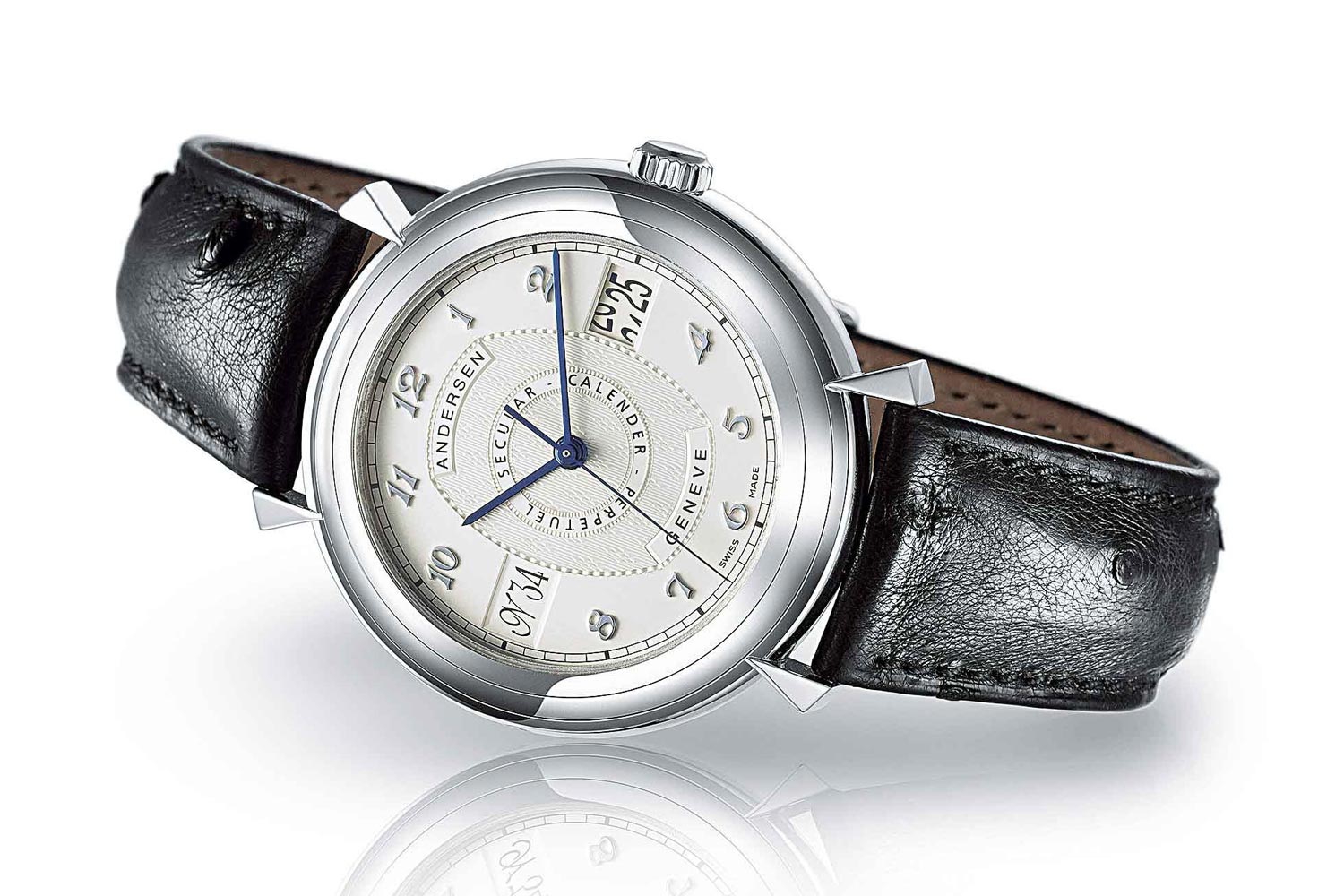Throwback – The most accurate type of calendar possible – the Andersen Genève Perpetuel Secular Calender

Yesterday, on February 29th, we decided to dig deeper into the concept of the perpetual calendar and explain why the leap year exists. It was the perfect occasion for this, since February 29th only occurs once every four years. In order to tell the story properly, we had to dive deeper into astronomy and history, and of course to have the various calendar watches. However one watch had our highest consideration, a watch that we almost forget about, but that has to be regarded as a serious technological achievement. This watch is equipped with something ultra-rare: a secular perpetual calendar. The secular perpetual calendar is even more accurate than a traditional perpetual calendar, or Quantième Perpetual (QP.) Let’s have a look at an old beauty, created by non-other than Svend Andersen. Here’s the Andersen Genève Perpetuel Secular Calender and the announcement that will be telling you more about this concept soon!
In our previous article, we explained what a perpetual calendar actually is, and how it works. And we also looked at the reasons why such a complication exists. Considering the shift between solar and civilian years, a day had to be added once every four years, in order to realign nature and administrative facts. Since Roman Emperor Julius Cesar, we have leap years. Then came a new type of calendar during the 16th century – the Gregorian Calendar – that was even more precise than the previous one. However the actual rotation of the moon and earth still didn’t exactly match, and now one day had to be removed once every 100 years. Resuming: every four years we have one extra day on February 29th, and once every 100 years, we don’t add February 29th. The years 1800 or 1900 for example were no leap years, and so will be all the years with 00 at the end (with the exceptions of the years divisible by 400, like 2000 or 1600, which are still leap years).
Although this might still be kind of confusing, let’s move on to the watch that is equipped with a calendar that does more than a “normal” perpetual calendar. One of the few watches known to feature a Secular Perpetual Calendar is made by one of the founders of the AHCI, mr. Svend Andersen.
We’re talking about an extremely rare complication, as to our knowledge, only 3 watches feature this complication:
- the Patek Philippe Calibre 89, a super-complicated pocket watch launched in 1989 in order to celebrate the 150th anniversary of the manufacture
- the Franck Muller Aeternitas 4, which is said to be the most complicated wristwatch ever manufactured
- the a discreet one, the Andersen Genève Perpetuel Secular Calender, created in 1996
The Andersen Genève Perpetuel Secular Calender perfectly hides its complications. When looking at its dial, you barely imagine what this watch is capable of. Remove the text on the dial and you’ll be in front of a simple 3-hander with date. However, there’s much more hidden on the back side.
The caseback of the the Andersen Genève Perpetuel Secular Calender displays the calendar information. Some indications are classical, like the indication of the month or the leap year (with traditional 1 / 2 / 3 / – sub-dial). However there are some indications that you probably have never seen before. For instance the sub dial that displays the year on a 400-year scale. While that might be a challenge to read, know that the large central hand is there to help “fine-read” the year.
This Andersen Genève Perpetual Secular Calender is programmed to the year 2400 with leap years and secular years. This means that you won’t have to adjust the date manually during 400 years (well, you have to consider that the watch must keep is running during this period… which won’t happen, as it will stop at least for service operations.) However do consider that it is programmed for the future secular years 2100 (28 Feb), 2200 (28 Feb), 2300 (28 Feb) and 2400 (29 Feb) and that’s very impressive!
For the rest, the Andersen Genève Perpetuel Secular Calender is an extremely discreet watch, with a 40mm case, a rather slim profile and a dial that only displays the date as a complication – in fact, the only indication you really need on a daily basis. This is the strength of great watchmakers: creating extremely complicated mechanisms without showing them off, while keeping a perfect daily legibility. This Andersen Genève Perpetuel Secular Calender is a lesson of watchmaking and of humility. It is a rare bird, as certainly less than 100 pieces have ever been manufactured. Finding one is difficult but some examples have been seen on auctions, and some even sold for a bargain price (in 2013, Antiquorum sold number 40, in platinum, for $13,750… not even the price of a time-only gold Rolex). If you ever find one, do hesitate, and buy it. It is one of the few chances to have an almost unique complication, featuring the most accurate calendar ever created.
Some news for Baselworld 2016
This year, Andersen Genève will introduce something new that is said to be “a watch that will display the 29th February correctly for leap years for centuries without any setting”. We can imagine that Svend Andersen will introduce his Perpetual Secular Calendar again! Like last year, when he re-introduced a new version of his iconic Worldtimer. However do pay attention, since the announcement also stated that only 20 pieces will be produced. Of course, we’ll show it to you just after Baselworld 2016, once this new edition officially launched.
All photos are credited to Christian Bissener, owner of “Watch Collector“, an official retailer of Andersen Genève in Luxembourg. More to read on his blog here.








2 responses
A masterpiece, but unfortunately not for my wallet
Marvelous watch. A pity the movement is hidden.